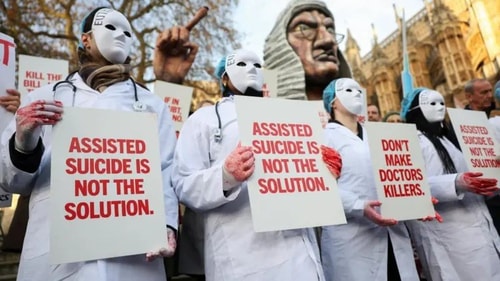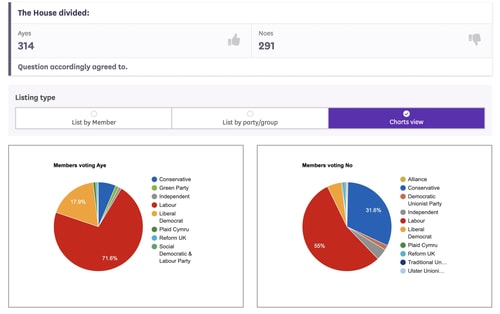On Friday, 20 June 314 MPs (a reduced majority of 23) voted in favour to legalise assisted suicide in England and Wales. The sanctity of life has been devalued from politics and within policymaking, how will the church respond and is the bill guaranteed to become law?
It is often said, how a society treats its most vulnerable is a reflection of how it measures and values humanity. I would like to go one step further and suggest the decision of politicians to conceive and propose to legalise assisted suicide in England and Wales is a reflection on how cultural Christianity has had greater influence over political discourse more so than Genesis 1:26 – 27; and for that we must lament.
A decision cloaked in the language of choice and compassion
Proponents of the bill and campaigners in support of legalising assisted suicide cloaked their arguments and ideas in the language of “compassion” and “dignity in dying”. They argued that to amend and repurpose the National Health Service Act from preserving life to a death service was giving people choice in the “treatment” they desire and that by withholding assisted suicide/death path to someone on the basis of feeling a burden, depressed or suffering with a mental illness was to deny choice.
What was more disheartening was that 314 MPs were so attached to progressive ideals that they wilfully ignored the many concerns raised by hospice leaders, disability groups and medical bodies on the specifics of the bill. To see how your MP voted at third reading visit parliament.uk.
The Royal College of Psychiatrists stated that they “cannot support the bill” (Royal College of Psychiatrists, May 2025). On Friday, 13 June the Royal College of Physicians and the Royal College of Psychiatrists stated the bill had “deficiencies” specifically citing that The Mental Capacity Act “does not provide a framework for assessing a person’s capacity to decide to end their own life” (Royal College of Psychiatrists, June 2025). Also, the Royal College of Pathologists outlined their concerns that a coroner would not investigate an assisted death (Clause 35). As the lead college for medical examiners, they say “that deaths following assisted dying should be notified to the coroner, just as other deaths following the administration of drugs, prescribed or not, must be” (The Royal College of Pathologists, June 2025). Amendments were proposed to address these issues, but all voted against.

Hours prior to the vote, The National Down Syndrome Policy Group sent a letter to MPs outlining deep concerns for those with Down syndrome and learning disabilities being vulnerable to coercion or manipulation should the bill become law (Independent News).
The progress of this bill into the Lords and a vote earlier on in the week to decriminalise abortion are two examples where progressive politics and ideals do not make for a strong foundation for developing social policy to respond to present challenges. In either proposal, it is the vulnerable who lose legal protections from individuals or the state. We now have a situation where public bodies resources and taxpayers’ money will be redirected away from those most in need towards those who shouted the loudest. This is not “compassion” or “dignity” as revealed to us throughout scripture and demonstrated so beautifully in the cross of calvary.

Our Lord and King emptied Himself of divinity and power (Philippians 2) and stepped into our brokenness (John 1) to carry our sin (Leviticus 16 and 1 Peter 2) and to bear the scars of a rebellious people (Romans 5); so that we would be clothed in His righteous (Philippians 3 and Colossians 3) and crowned in His glory (Psalm 8, Isaiah 61 and 2 Timothy 4).
Politics know little about the power of the gospel to redeem and restore communities or a nation; so, let it be the responsibility of His bride in the UK to model this kind of care and affirm dignity to all people, particularly to those nearing the end of life.
In supporting Kim Leadbeater's assisted suicide law MPs have failed to stop a dangerous, unworkable and immoral policy. This law, if supported by the House of Lords, will undermine the value of life and place vulnerable people at greater risk.

A time for the church to lament
At the time the vote was announced I was attending a rally outside parliament in Westminster, co-organised by Christian Concern.
When we learned of the result, our collective response was to turn the protest into a prayer meeting. Several broke out in spontaneous worship, others and myself began to pray, declaring an unwavering confidence in Jesus and His promises. The feeling of lament was palatable in the atmosphere and contagious.
Friday’s result is not the outcome we had longed for. I do believe it is a time for the church to lament parliament’s decision to ignore wise counsel and choose death instead of protecting life, but.… As the psalmist says “O Lord, you have heard the desire of the humble; You will strengthen their heart, you will incline your ear. To vindicate the orphan and the oppressed, so that man who is of the earth will no longer cause terror” (Psalm 10: 17 – 18 — NASB).
Could the Lords block the bill?
That is our prayer and a strong possibility.
Constitutional commentators and legal minds, on both sides of the debate, have written extensively over the weekend on whether it is constitutional for the Lord’s to vote down a bill in the Commons and if they did how would they go about it. As a revising chamber and with many outspoken peers on the efficacy of this bill, it is expected there will be many amendments tabled, making it highly likely that this bill will not reach a conclusion till early 2026.
Regardless, it is our intention to monitor closely the amendments proposed in the Lords and to work to stop this bill becoming law. It remains our view that a legalising assisted suicide is a dehumanising piece of legislation where those dependent on health and social care support will be treated unjustly. The focus of the church is to remember the Lord is sovereign of all and advocate for dignity at the end of life by urging parliamentarians to invest in palliative care provision in the community and in specialists services.

Parliament votes to legalise unsafe and dangerous abortion
Both Lives UK lead Dawn McAvoy responds to Westminster’s recent vote on abortion legislation and reaffirms that both lives in pregnancy matter and both deserve better



